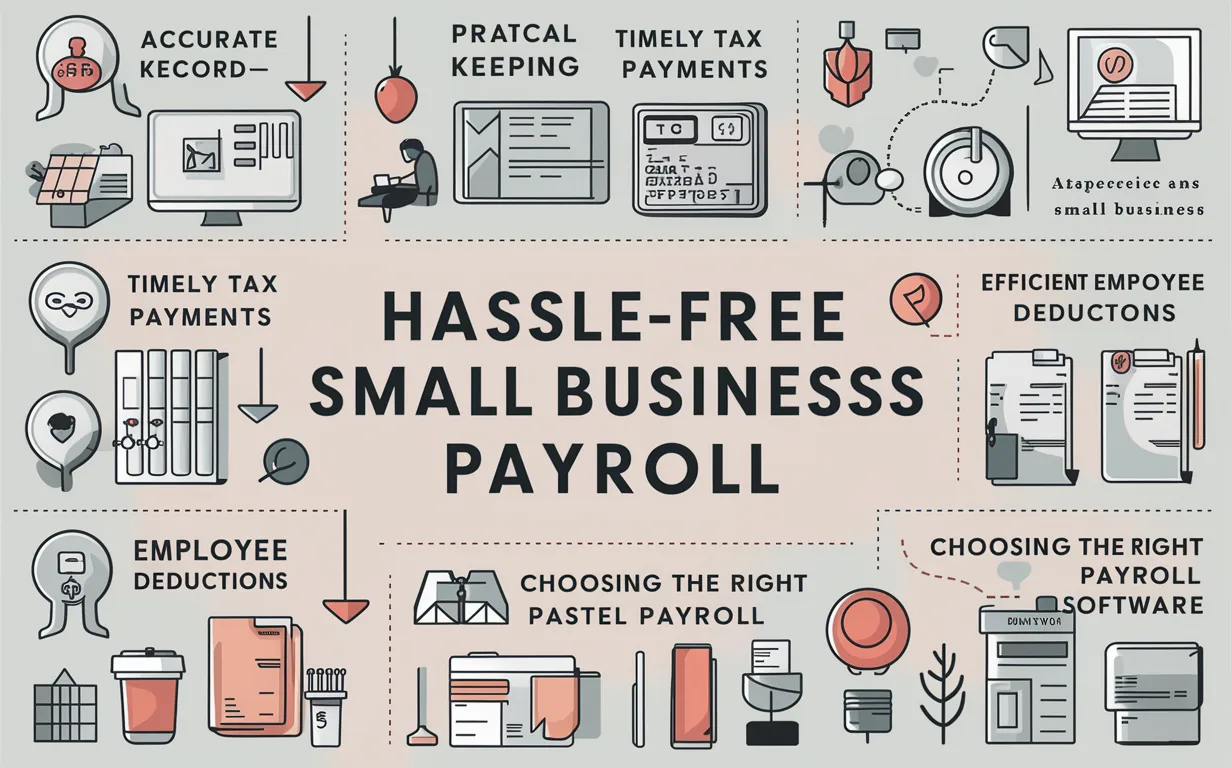Focus on What Matters: Practical Tips for a Hassle-Free Small Business Payroll
Why Efficient Payroll Management Is Essential
Efficient payroll management is vital for the success of any small business. Accurate and timely payroll processing helps maintain employee satisfaction and ensures the company stays compliant with tax regulations. According to a Forbes article, streamlining payroll processes can significantly reduce administrative burdens and mitigate the risk of errors. Utilizing small business payroll services can greatly simplify these complex tasks, allowing owners to focus more on their core business operations. Ensuring payroll is handled efficiently means business owners can concentrate their energy on growth and customer satisfaction rather than being bogged down with payroll issues.
Automated Payroll Systems
Implementing an automated payroll system is one of the best ways to simplify payroll tasks. These systems can handle everything from calculating salaries and deductions to direct depositing funds into employee accounts. Automated payroll systems also generate comprehensive reports that can help with auditing and compliance. Automation helps significantly reduce the risk of human error, which can lead to costly mistakes. Moreover, automated systems can offer real-time data and insights, assisting companies in making defensible choices regarding their personnel and spending.
The most effective payroll systems also offer features such as tax filing services, benefits management, and employee self-service portals. These additional functionalities can save considerable time and reduce the likelihood of errors. Investing in automation technology for payroll processes can lead to long-term cost savings by eliminating the need for manual data entry and reducing the risk of compliance penalties.
Organizing Your Payroll Process
Organization is key to hassle-free payroll management. Small business owners can streamline payroll procedures by keeping precise records and remembering crucial dates like pay periods and tax deadlines. Calendars and reminder systems can also help you stay organized. A well-organized payroll process not only saves time but also minimizes the chances of errors.
Essential Organizational Tips
- Create a comprehensive payroll calendar: Maintain a calendar that includes all pay dates, tax deadlines, and other key payroll-related events. This can prevent missed deadlines and ensure timely processing.
- Ensure all employee records are up-to-date: Keep thorough and up-to-date records of all employees, including their personal information, employment status, and payment details. This will make payroll processing more efficient and accurate.
- Regularly back up payroll data to avoid loss: Regular backups can protect the company from data loss due to technical issues or human error. A fail-safe to recover critical payroll data if needed is essential.
- Utilize payroll software to maintain detailed records and generate reports: Payroll software can simplify data management by automatically organizing and storing detailed records. This ensures that all necessary information is easily accessible and can be used to generate accurate reports when needed.
Staying Compliant with Labor Laws
Compliance with labor laws is crucial to avoid penalties and legal issues. Understanding the current labor regulations and ensuring that all payroll practices adhere to these laws can save businesses a great deal of trouble. Regular training and updates on labor laws can keep the payroll team well-informed. Ignorance of the law can lead to significant fines and damage to the company’s reputation.
Ensuring compliance involves understanding federal, state, and local labor laws, which vary significantly. Employers must adhere to minimum wage laws, overtime regulations, and tax withholding requirements. Regular compliance audits can help identify and rectify discrepancies before they lead to legal issues. Furthermore, companies should have policies and procedures for handling employee complaints and resolving disputes per the law.
Tips for a Hassle-Free Payroll
Here are some practical tips for maintaining a smooth payroll process:
- Use reliable payroll software to automate calculations and payments: Choosing the right payroll software can drastically reduce manual work and error rates. Ensure the software suits your business’s specific needs and integrates well with other systems you use.
- Regularly audit payroll processes to ensure accuracy and compliance: Regular audits can help identify and correct issues early. This practice ensures that your payroll process is accurate and compliant with the latest regulations.
- Keep detailed records of all payroll transactions: Meticulous record-keeping provides a clear audit trail, making it easier to resolve discrepancies and comply with legal requirements. Store these records securely and back them up regularly.
- Stay updated on labor laws and tax regulations: Changes to labor laws and tax regulations can significantly impact your payroll processes. To stay informed, subscribe to industry newsletters, attend webinars, and participate in training sessions.
- Provide training for employees involved in payroll management: Continuous education and training can help your payroll team stay proficient in the latest tools and best practices. Well-trained employees are less likely to make mistakes, ensuring smoother payroll operations.
Leveraging Professional Services
For small business owners who find payroll management overwhelming, leveraging professional payroll services can be a game-changer. Professional services can handle all aspects of payroll, from processing payments to ensuring compliance with regulations, allowing business owners to focus on other critical aspects of their operations. Outsourcing payroll can also provide businesses access to expertise and technologies that they might be unable to maintain internally.
Hiring a professional payroll service provider can also bring peace of mind. These providers are often well-versed in the nuances of tax regulations and labor laws, reducing the risk of non-compliance. Additionally, outsourcing payroll can help avoid the costs associated with hiring and training in-house payroll staff, freeing up resources to invest in other business areas.
Stay in touch to get more updates & news on Verifiedzine!






